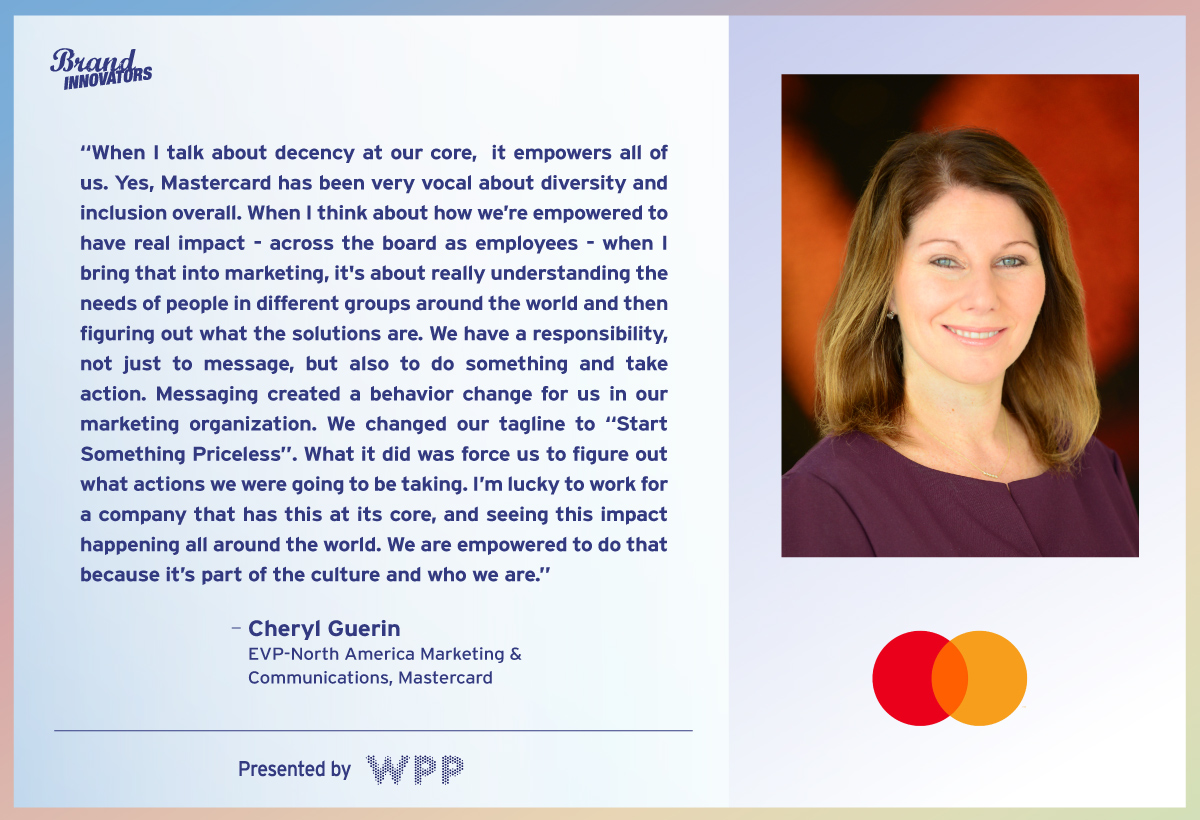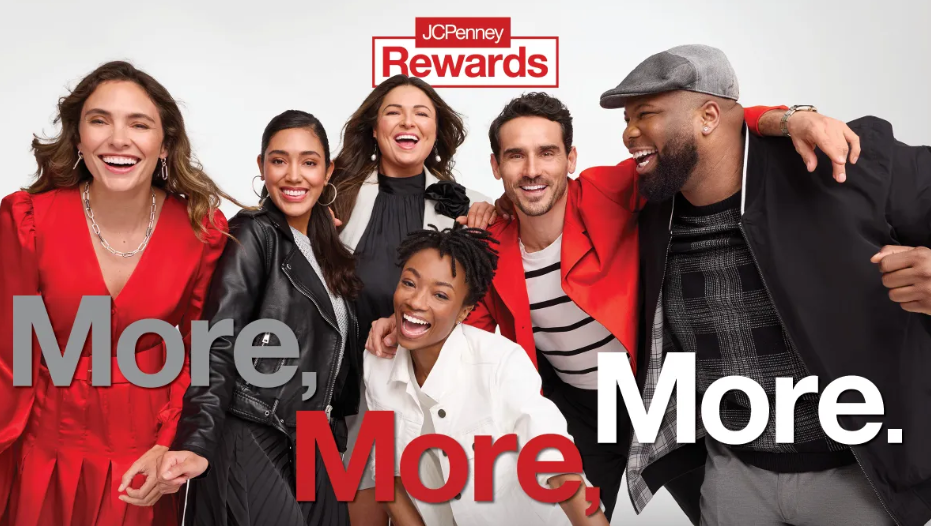Mastercard has long been a supporter of the LGBTQ+ community. That support has manifested most recently in the brand’s “Acceptance Matters” and “True Name” campaigns, dual efforts aimed at educating and enlightening people about the community as well as providing a first-of-its-kind opportunity for transgender and nonbinary customers to use their chosen name on credit and debit cards.
Cheryl Guerin, EVP-North America Marketing & Communications, Mastercard said that it is important for brands to have a point of view and take a stand on issues you care about — otherwise, you will be left sitting on the sidelines.
“Being inclusive is understanding the pain points, if there are any weaknesses in what we’re offering, if there are any biases in what we’re doing,” said Guerin at Brand Innovators’ Marketing to the LGBTQ+ Community livecast on Feb 25. “There’s no one single group. Everyone is an individual in that group with different dynamics. To us, it means taking actions.”
Inclusion is central to Mastercard’s core pillars as a company, which means a lot of internal conversations about the notion of decency – ensuring that respect is shown for all human beings.
“When I talk about decency at our core, it empowers all of us,” said Guerin. “Yes, Mastercard has been very vocal about diversity and inclusion overall. When I think about how we’re empowered to have real impact – across the board as employees – when I bring that into marketing, it’s about really understanding the needs of people in different groups around the world and then figuring out what the solutions are. We have a responsibility, not just to message, but also to do something and take action. Messaging created a behavior change for us in our marketing organization. We changed our tagline to ‘Start Something Priceless.’ What it did was force us to figure out what actions we were going to be taking. I’m lucky to work for a company that has this at its core, and seeing this impact happening all around the world. We are empowered to do that because it’s part of the culture and who we are.”
Diageo’s Smirnoff has been marketing to the LGBTQ+ community since 1968 and the brand has been pushing boundaries ever since.
“If they had the courage to do that then, we can have the courage to do big things now,” said Jay Sethi, Chief Marketing Officer, Diageo Beer. “And that includes year-round representation. Laverne Cox is not just our ambassador during Pride Month, she’s our ambassador all the time. She’s amazing at it and she’s at the intersection of conversations about race, gender and identity. It’s about choosing to be on the side of this community, all year long.”
For Sethi, purpose followed by action is key to marketing to the LGBTQ+ community. This means not just having a statement about supporting the community but actions behind them such as diversity goals and KPIs. For example, the company aims to hire a diverse community of talent to help empower these different communities at work. Having this supportive environment has helped Sethi in his career path.
“I remember thinking to myself ‘you’re already brown, you can’t be gay too,’” he said. “It’s too much to ask of people. And once I came out, I realized how wrong I was about my friends, family and even work. I didn’t lose my job and arguably I think it’s gotten better. I often say that it gets better because we get better. I’m also working to unapologetically make room for other people and be loud about it.”
One way that Diageo has upped the ante is a recent change in their family leave policy that gives six months leave to any new parent regardless of gender or method of having the new baby.
“For the LGBTQ+ community, that is life changing,” he explained. “It opens up possibilities that you could never have envisioned before. That makes working for Diageo incredible.”
Sethi was joined at the summit by senior marketing executives at Best Buy, Mondelez International, Procter & Gamble and Electronic Arts. Here are five key takeaways for marketing to the LGBTQ+ community. Head to Brand Innovators’ YouTube page to watch the whole event.
Walk the Walk. Brands need to go beyond paying lip service to supporting the LGBTQ+ community and take action in how they run their business and how they communicate with consumers.
“We know that consumers want to see brands who walk the walk,” said Emily Finn, Brand Strategist, Best Buy Cultural Marketing, Best Buy. “We’re past the days where you can just throw a rainbow on a product and make that a Pride campaign. It’s about speaking to subgroups and communities authentically which really comes down to listening to people.”
Know Your Values. Last year, the Oreo brand transitioned from showing support to the LGBTQ+ to driving change. Many LGBTQ+ teens are afraid of coming out for fear that their families will not support them. So Oreo partnered with PFLAG on a film with the goal of inspiring people to stand up and share their love for the LGBTQ+ individuals in their lives. The film featured a real couple and walked viewers through the journeys of acceptance and pride within real families.
“My advice for brands would be: Know your values,” said Justin Parnell, Senior Director, OREO Brand, Mondelez International. “For Oreo, it’s based on the history we have in people’s lives. We want to be a part of every family’s life and create those joyful moments of connection, no matter what your family looks like. That leads to our core values around inclusivity and wanting to spread joyfulness and acceptance in the world. Your authenticity as a brand should inspire action and change. We want to use our influence and scale as a brand to make positive change.”
Be a Good Listener. Diageo has found that listening to the community and responding to what they hear makes them a supportive brand,
“What really bonded me with our women in the LGBTQ community was talking over drinks and having a trusted brand,” said Natalie Turk, Manager, Brand Renovations, Customer Marketing, Diageo. “That is something that needs to be at our core. You need to be a brand that is trusted. Innovation can be born out of any concept but if you’re not trusted and authentic, your innovation could fall flat.”
Create Inclusive Content. Electronic Arts creates gaming experiences that puts players in the role of characters and the brand aims to create a diverse cast of characters so that everyone can feel represented in the game.
“When you’re building content, you’re putting yourself in the shoes of a specific character, and putting yourself in a world, whether that’s a fantasy world, or reflective of the one we’re living in,” said Jonathan Roman, Global Director of Marketing Technology Solutions, Electronic Arts. “We make sure we’re reflecting that diversity in our characters. A lot of people are looking to find themselves and find representation in these games. The Sims is a really strong example. It’s a game built around you creating an alternative life for yourself. Everyone playing The Sims deserves to see themselves represented. It’s not enough to just throw in representation, but how does that really organically live throughout the gaming experience. If the product is built in a genuine and authentic way in that regard, your audience will vocalize that and you’ll see that positive public sentiment.”
Keep the Community Connected. When pride celebrations around the world were being cancelled last year due to COVID, Procter & Gamble stepped up to ensure that this unifying experience would not be lost at a time when people were feeling more isolated than ever.
“Pride has always given people a window into a world or a community, that says: ‘there are people out there like me,'” said Brent Miller, Senior Director, Global LGBTQ+ Equality, Procter & Gamble. “When you cut off that lifeline from people, it can often mean feelings of increased isolation, and a lack of support. There’s a real element of identity that has been impacted for the LGBTQ+ community. As a leading advertiser, we wanted to use the privilege we have to address that loss of visibility. We launched Can’t Cancel Pride, as a way to bring the entertainment community and brands together, and we were able to raise $4 million for a host of LGBTQ+ organizations.”




